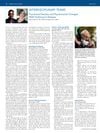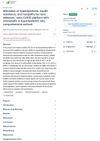 105 citations,
January 2010 in “Mediators of Inflammation”
105 citations,
January 2010 in “Mediators of Inflammation” Skin surface lipids are important for skin health and altering them could help prevent aging and treat skin conditions.
 February 2025 in “IntechOpen eBooks”
February 2025 in “IntechOpen eBooks” Postpartum care should address hormonal changes, nutrition, and support to ensure mother and baby well-being.
 36 citations,
September 2009 in “Journal of Cellular and Molecular Medicine”
36 citations,
September 2009 in “Journal of Cellular and Molecular Medicine” New treatments targeting skin stem cells show promise for skin repair, anti-aging, and cancer therapy.
36 citations,
July 1980 in “Journal of Toxicology and Environmental Health” High doses of ethynylestradiol in rats caused growth issues, organ changes, and some tumors, but didn't increase overall tumor rates.
 27 citations,
May 2016 in “Dermatologic Surgery”
27 citations,
May 2016 in “Dermatologic Surgery” Male faces age with more wrinkles and hair loss, influenced by both body changes and environmental factors.

The interdisciplinary approach improved the quality of life for a Parkinson's patient and eased staff workload.
 79 citations,
January 2017 in “Dermatology practical & conceptual”
79 citations,
January 2017 in “Dermatology practical & conceptual” Correcting nutrient deficiencies may help with hair loss, but the benefits of supplements without a deficiency are uncertain and could be harmful.
 April 2017 in “The FASEB Journal”
April 2017 in “The FASEB Journal” Eating more vitamin A changes hair growth-related proteins in mice, affecting hair cycle stages.
 15 citations,
January 2016 in “Przeglad Menopauzalny”
15 citations,
January 2016 in “Przeglad Menopauzalny” Eating a balanced diet with specific nutrients is important for menopausal women to manage hair loss.
 39 citations,
January 2013 in “Indian Journal of Dermatology, Venereology and Leprology”
39 citations,
January 2013 in “Indian Journal of Dermatology, Venereology and Leprology” Eating high glycemic foods and drinking milk may worsen acne by increasing insulin and IGF-1 levels.
 May 2024 in “Food bioscience”
May 2024 in “Food bioscience” Wood sterol may help reduce hair loss caused by a high-fat diet.

Calorie restriction changes the elemental and isotopic makeup of mouse hair and bone.
 26 citations,
December 2016 in “Psychiatric Clinics of North America”
26 citations,
December 2016 in “Psychiatric Clinics of North America” Testosterone therapy and surgeries like mastectomy improve transgender men's lives and mental health with low risks and high satisfaction.
1 citations,
April 2018 in “Journal of dairy science” Dairy cows' skin and hair follicles change size and growth phase around the time they give birth.
 January 2017 in “International journal of clinical & experimental dermatology”
January 2017 in “International journal of clinical & experimental dermatology” Eating a balanced diet with vitamins, micronutrients, and antioxidants is important for hair health and can help with hair loss.
 179 citations,
July 2016 in “Nature Reviews Molecular Cell Biology”
179 citations,
July 2016 in “Nature Reviews Molecular Cell Biology” Epigenetic changes control how adult stem cells work and can lead to diseases like cancer if they go wrong.
 35 citations,
August 1980 in “Circulation”
35 citations,
August 1980 in “Circulation” Minoxidil may cause heart issues in animals and humans.
 4 citations,
May 2024 in “The Lancet”
4 citations,
May 2024 in “The Lancet” Bariatric surgery improves ovulation rates in women with PCOS and obesity better than medical therapy.
 5 citations,
January 2020 in “in Vivo”
5 citations,
January 2020 in “in Vivo” Testosterone changes important cell communication proteins in pregnant rats' uteruses, which might affect pregnancy success.
 3 citations,
April 2019 in “Human & Experimental Toxicology”
3 citations,
April 2019 in “Human & Experimental Toxicology” Finasteride causes harmful organ changes in female mice.
 49 citations,
February 2020 in “Scientific reports”
49 citations,
February 2020 in “Scientific reports” The nanohybrid system significantly improved wound healing and showed strong antibacterial activity.
 3 citations,
January 2007 in “Elsevier eBooks”
3 citations,
January 2007 in “Elsevier eBooks” The document concludes that individualized treatment and lifestyle changes are important for managing menopause symptoms and health risks.
6 citations,
July 2018 in “Steroids” Testosterone changes how certain channels work in male rat reproductive tracts, affecting fertility-related fluid balance.
 1 citations,
January 2022 in “Turkiye Klinikleri Journal of Dermatology”
1 citations,
January 2022 in “Turkiye Klinikleri Journal of Dermatology” Lifestyle changes during the early COVID-19 outbreak led to more cases of acne and other skin conditions, but fewer cases of rosacea and skin infections.
 25 citations,
November 2014 in “Ageing Research Reviews”
25 citations,
November 2014 in “Ageing Research Reviews” Skin aging is caused by stem cell damage and can potentially be delayed with treatments like antioxidants and stem cell therapy.
 12 citations,
March 2011 in “Journal of pathology”
12 citations,
March 2011 in “Journal of pathology” Oncogenic K-ras causes rapid cancerous changes in the mouth's lining.
 5 citations,
October 1984 in “The BMJ”
5 citations,
October 1984 in “The BMJ” Up to 50% of scalp hair can be lost before it appears thin, and treatment is only needed for hair loss caused by diseases or deficiencies.
 January 2023 in “Research Square (Research Square)”
January 2023 in “Research Square (Research Square)” Nano selenium and CoQ10 helped reduce blood fat levels and insulin resistance while preventing muscle damage from statin drugs in rats.
 20 citations,
August 2022 in “Archives of Medical Science”
20 citations,
August 2022 in “Archives of Medical Science” The Polish medical societies have redefined metabolic syndrome and recommend lifestyle changes, certain medications, and possibly bariatric surgery for treatment. They also discuss managing related health conditions.
 68 citations,
January 2022 in “International Journal of Molecular Sciences”
68 citations,
January 2022 in “International Journal of Molecular Sciences” PCOS management includes lifestyle changes and medications, with ongoing research into repurposed drugs for better treatment options.



























